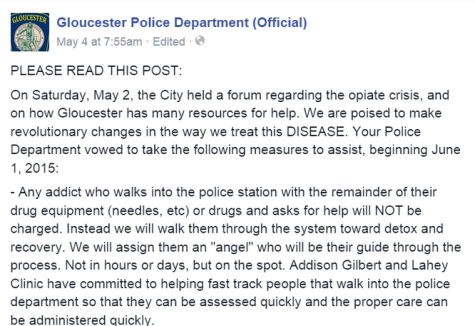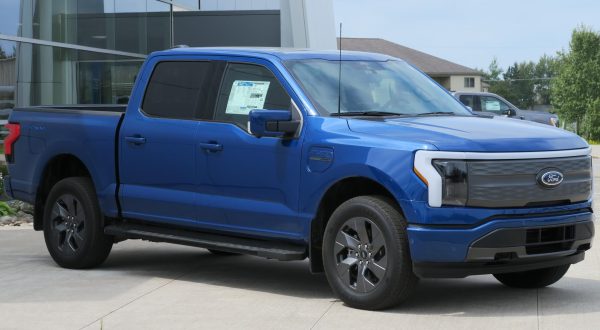Gloucester, MA Decides Addicts are Not Criminals

Part of Gloucester Police Chief Leonard Campanello’s Facebook post announcing the city’s new system.
In an effort to combat a heroin problem that law enforcement officers in Gloucester, MA have been struggling with, opiate addicts will now receive help instead of being charged with a crime. This new system, announced by Police Chief Leonard Campanello in a Facebook post on May 4, 2015, will allow for addicts to recover instead of giving them even more obstacles with an incarceration.
Referring to opiate addiction as a “disease,” Campanello explains the new system that will walk addicts down the road to recovery. Addicts who enter the station, even if they are in possession of paraphilia or drugs, will not be charged. Instead, they will be assigned an “angel” to be their guide throughout the process of recovery.
This move is seen by many as a progressive step in the fight against drug addiction. It comes as a response to a local opiate crisis that has become increasingly plaguing to Gloucester; leading to four overdoses in the past year, Boston.com reported.
When asked about the new system, Campanello told Boston.com, “We’re committed to the idea of attacking the demand rather than attacking the supply.” This proactive approach has been proven effective with programs like Seattle, WA’s Law Enforcement Assisted Diversion program which helps addicts get clean instead of sending them to jail. It identifies the fact that addicts are not to blame, as well as addresses the idea that it is easier to help people stop needing drugs than to make dealers stop selling them.
Boston.com reported that in 2014 more than 1,000 people died of opiate overdose in Massachusetts, the highest number ever reported. Campanello, along with the entire Gloucester community, hopes that this new program will help to lower this statistic. Part of this program includes making Nasal Narcan available at local pharmacies without a prescription. Nasal Narcan can be used to reverse an opiate overdose, often referred to as the “opiate antidote.”
In his Facebook post, Campanello explained the new availability of Nasal Narcan that is included in the program. “The police department has entered into an agreement with Conleys [sic] and is working on one with CVS that will allow anyone access to the drug at little to no cost regardless of their insurance. The police department will pay the cost of [Nasal] [Narcan] for those without insurance. We will pay for it with money seized from drug dealers during investigations. We will save lives with the money from the pockets of those who would take them.”
Gloucester will be the first city in Massachusetts to enact such a program when it officially begins on June 1st of this year.










